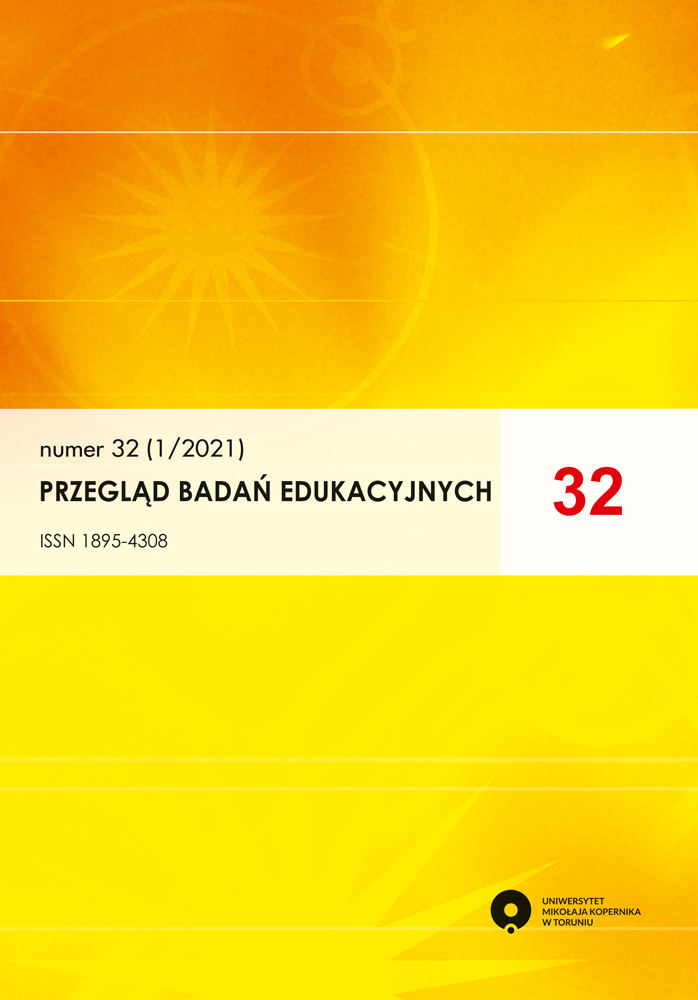Cross-Cultural Research: Insider/Outsider Dichotomy Reconsidered
DOI:
https://doi.org/10.12775/PBE.2021.012Słowa kluczowe
cross-cultural research, insider/outsider, cultural empathy, decolonizing methodologyAbstrakt
The aim of my article is to confront the insider/outsider dichotomy with the present state of cultural research from the meta-analytical perspective. In the beginning, the paper reconstructs classical Robert Merton’s theory of insider/outsider and the research potential of its basic assumption. Then, the emic-/etic approaches, as well as absolutist and constructivist approaches to cross-cultural research, are considered. The four James Bank’s types of cultural researchers and Richard Hanvey’s cultural empathy levels are presented against the background of multicultural reality. Further, the opposition of indigenous epistemology and the Western one is analyzed, as well as potential value of decolonizing methodology is emphasized. Finally, the article brings solid conclusions regarding the importance of the insider/ outsider dichotomy as a tool for understanding the key issues of cross-cultural research even in our current global era.
Bibliografia
Adamopoulos, J., & Lonner, W.J. (2001). Culture and Psychology at a Crossroad: Historical Perspective and Theoretical Analysis. In: D. Matsumoto (Ed.), The Handbook of Culture and Psychology (pp. 11–34). Oxford: Oxford University Press, doi: 10.1093/oso/9780190679743.001.0001.
Adler, P. (1975). The Transitional Experience: An Alternative View of Culture Shock. Journal of Humanistic Psychology, (15)4, 13–23.
Barnard, A. (2009). Emic and Etic. In: A. Barnard, & J. Spencer (Eds.), The Routledge Encyclopedia of Social and Cultural Anthropology (pp. 220–223). London: Routledge.
Berry, J.W., Poortinga, Y.H., Segall, M.H., & Dasen, P.R. (2002). Cross-Cultural Psychology. Research and Applications. Cambridge: Cambridge University Press.
Crossley, M., Lore, A., & McNess, E. (2016). ‘Ethnographic Dazzle’ and the Construction of the ‘Other’: Shifting Boundaries Between the Insider and Outsider. In: M. Crossley, A. Lore, & E. McNess (Eds.), Revisiting Insider-Outsider Research in Comparative and International Education (pp. 21–38). Bristol: Syposium Books, doi: 10.15730/books.93.
Deardorff, K. (2006). Process Model of Intercultural Competence, Global University Network for Innovation. Retrived 18 October 2020 from http://www.guninetwork.org/articles/process-model-intercultural-competence.
Emeagwali, G., & Shizha, E. (2020). Interconnecting History: African Indigenous Knowledge and the Sciences. In: G. Emeagwali, & E. Shizha (Eds.), African Indigenous Knowledge and the Sciences: Journeys Into the Past and Present (pp. 3–11 ). Rotterdam: Springer, doi: 10.1007/978-94-6300-515-9.
Fetterman, D.M. (1998). Ethnography: Step by Step. London: Sage.
Garcia, A.C. (2014). The “Outsider/Insider” Assignment: A Pedagogical Innovation for Teaching Cross Cultural Understanding. International Journal of Teaching and Learning in Higher Education, 2014, (26)3, 453–462.
Hanvey, R.G. (1975). An Attainable Global Perspective. Washington: Eric Clearinghouse.
Helfrich, H. (1999). Beyond the Dilemma of Cross-Cultural Psychology: Resolving the Tension Between Etic and Emic. Culture and Psychology, (5)2, 131–513.
Kuldeep, K., Bakhshi, A., & Rani, E. (2009). What Is Cross-Cultural Research? International Journal of Psychological Studies, (1)2, 82–96.
Liamputtong, P. (Ed.) (2008). Doing Cross-Culture Research. Ethical and Methodological Perspectives. Australia: Springer.
Liamputtong, P. (2010a). Performing Qualitative Cross-Cultural Research. Cambridge: Cambridge University Press.
Liamputtong, P. (2010b). Cross-Cultural Research and Qualitative Inquiry. Turkish Online Journal of Qualitative Inquiry, (1)1, 16–29.
Melosik, Z. (2014). Kultura popularna i tożsamość młodzieży. W niewoli władzy i wolności [Popular Cultur and Youth Identity. In Captivity of Power and Freedom]. Kraków: Oficyna Wydawnicza Impuls.
Merton, R. (1972). Insiders and Outsiders: A Chapter in the Sociology of Knowledge. American Journal of Sociology, (78)1, 9–47.
Morris, M., Leung, K., Ames, D., & Lickel, B. (1999). Views From Inside and Outside: Integrating Emic and Etic Insights About Culture and Justice Judgment. Academy of Management Review, (24)4, 781–796, doi: 10.5465/amr.1999.2553253.
Norris, R., Norris P., & Norris, C. (2009). Emu Dreaming: An Introduction to Australian Aboriginal Astronomy. Sydney: Emu Dreaming Press.
Pedersen, P., Crethar, H.C., & Carlson, J. (2008), Inclusive Cultural Empathy: Making Relationships Central in Counseling and Psychotherapy. Washington: American Psychological Association.
Schwand, T. (2007). The Sage Dictionary of Qualitative Inquiry. Los Angeles: Sage, doi: 10.4135/9781412986281.
Segall, M.H., Lonner, W., & Berry, J. (1998). Cross Cultural Psychology As a Scholarly Discipline, On the Flowering of Culture in Behavioral Research. American Psychologist, (53)10, 1101–1110.
Suwankhong, D., & Liamputtong, P. (2015). Cultural Insiders and Research Fieldwork: Case Examples From Cross-Cultural Research With Thai People. International Journal of Qualitative Methods, (14)5, 1–7. doi: 10.117(2015)7/1609406915621404.
Tuhiwai Smith, L. (2006). Decolonizing Methodologies: Research and Indigenous Peoples. London: Zed Books.
Walter, M., & Andersen, Ch. (2013). Indigenous Statistics: A Quantitative Research Methodology. Walnut Creek: Left Coast Press, doi: 10.4324/9781315426570.
Wray, S., & Bartholomew, M. (2010). Some Reflections of Outsider and Insider Identities in Ethnic and Migrant Qualitative Research. Migration Letters, 7(1), 7–16.
Ziai, A., Bendix, D., & Müller, F. (2020). Decolonizing Knowledge Orders, Research Methodology and The Academia: An Introduction. In: D. Bendix, F. Müller, F., & A. Ziai (Eds.), Beyond the Master’s Tool? Decolonizing Knowledge Orders, Research Methods and Teaching (pp. 1–16). Lanham: Rowman and Littlefield Publishers.
Pobrania
Opublikowane
Jak cytować
Numer
Dział
Statystyki
Liczba wyświetleń i pobrań: 826
Liczba cytowań: 0



